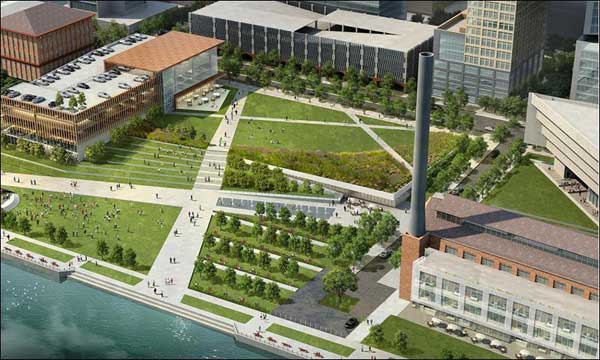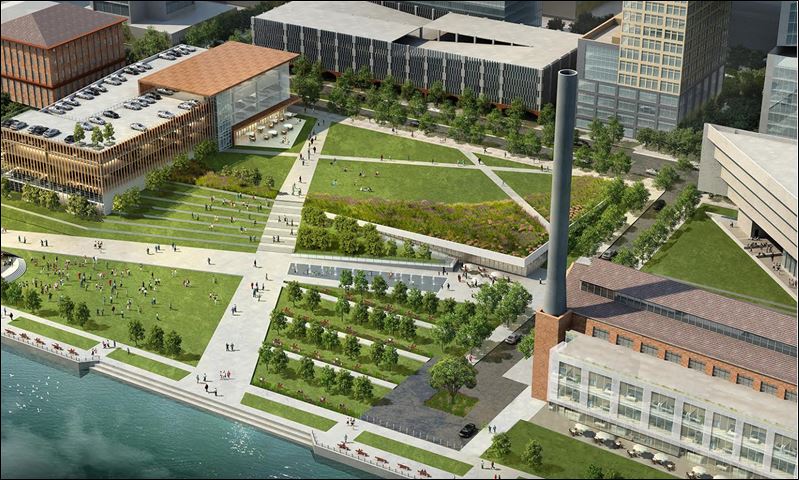

Influential community leaders stepped up to the plate at Toledo City Council chambers Jan. 14 to weigh in on ProMedica’s plan to move its headquarters Downtown.
The move is projected to bring $9.2 million in net revenue to Toledo over 10 years, city officials announced.
Joe Napoli, Carty Finkbeiner, Judge James G. Carr and Bob LaClair were a few of those who addressed Council as members of the public to weigh in on the health care company’s plan to move Downtown in 2017.
The most controversial part of Pro- Medica’s plan is the proposed construction of a six-story parking structure in the southwest corner of Promenade Park. The structure — which would occupy 14 percent of the park’s surface area and 120 feet of the park’s 500 feet of frontage along Summit Street — is a key part of ProMedica’s $60-million plan to move up to 1,000 employees into the former Toledo Edison Steam Plant and KeyBank building Downtown.
ProMedica officials have said future phases could bring as many as 2,500 employees Downtown. There is no timeline on when subsequent phases would be implemented.
“We shouldn’t kid ourselves — many business leaders and investors are watching this decision with great interest,” said Napoli, president and general manager of the Toledo Mud Hens and Toledo Walleye. “ProMedica wasn’t recruited to come Downtown, they called us. Small business leaders that are on the fence about moving Downtown are asking themselves, ‘If the City of Toledo doesn’t welcome ProMedica to Downtown, why would they welcome us?’”
Napoli, who also serves as chair of the ProMedica Toledo Children’s Hospital board, said ProMedica should be commended for being committed to moving Downtown.
“The lack of ample, convenient parking will seriously hinder the future growth of Downtown Toledo,” he said. “To their credit, ProMedica didn’t overreact to the Downtown parking challenge. Most others would have given up, and they did for years. Instead, ProMedica embraced the challenge, studied the issue, and came up with a solution — exactly what a responsible corporate citizen would do.”
The first part of the meeting consisted of a Q-and-A session between Council and Matt Sapara, city development director, and Eileen Granata, the city’s senior attorney, on the Memorandum of Understanding (MOU) between the city and ProMedica. The MOU sets forth key components of the project, highlighting commitments necessary from both the city and ProMedica to keep the project moving forward.
Sapara said the project would amount to net revenue of $9.2 million to the city over 10 years, while the expense to the city for the first year would be $693,000. The city would convey the land for the parking garage to ProMedica at no cost. The company, in turn, would restore and put $2 million worth of renovations into Promenade Park, which would remain open for use by the public.
The city would be responsible for maintaining the park. If, however, the park were not maintained to ProMedica’s liking, it could step in and maintain the park at its own cost.
Councilman Mike Craig voiced concern over the city’s ability to maintain the park.
“Park maintenance is not something the city of Toledo is known for,” he said. “I would feel better taking that money and writing a check every year for the maintenance of that property. I just don’t think we’re going to maintain that property to their standards.”
Councilman Jack Ford, who worked for ProMedica for six years, pressed Sapara and Granata for answers on several topics he felt had not been properly addressed. He asked how significantly the MOU has changed since the company first presented it to the city.
“It has not changed in the sense of the scope of the project,” Granata said. “There have been certainly changes in terms of some of the property, in terms of some of the ownership and how that property is handled. … There were substantive changes.”
The MOU states that the city will also convey most of the green space between the steam plant and Imagination Station to ProMedica, which would allow use of the land by the public until or unless ProMedica decides to modify the site to accommodate its needs.
Ford questioned if this control of the site could be turned over to Pro- Medica at any time, as no specific timeline is given.
Granata said under this arrangements ProMedica could in fact take over the site as it sees fit for future expansion.
“I don’t really know what exactly that means in terms of future plans, but you’re correct in your statement,” she said.
“Should that be important to us, or is that a toss-away issue?” Ford responded.
Sapara said there aren’t any tossaway issues, but any future plans remain open-ended at this time.
More than 20 members of the public signed up to speak at the hearing.
After Napoli, a number of prominent business individuals addressed Council, including Steve Cavanaugh of HCR ManorCare, which employs 800 people Downtown, and Sara Swisher, director of EPIC Toledo, which was created by the Toledo Regional Chamber of Commerce to attract and retain young professionals in the region. Both are proponents of ProMedica’s plan.
LaClair, president and CEO of Fifth Third Bank in Northwest Ohio, agreed with much of Napoli’s statement.
LaClair, a ProMedica board member, said, “It’s very difficult to recruit people to Toledo. The first thing a candidate says when they come to meet with us is ‘Where are all the people Downtown? Why do you have all these empty buildings?’
“We need people walking around Downtown during the day, showing up in offices, eating in restaurants during the lunch hour. That’s what’s going to revitalize Downtown Toledo. We’ve got an opportunity that we have not seen in 30 years to do that right now.”
Former Toledo Mayor Carty Finkbeiner also addressed Council.
“New jobs and great hospitals are very important to Toledo’s future,” he said. “But so is fresh air, clean water — as we learned last summer — and public waterfront parks.”
Finkbeiner said he hopes Pro- Medica’s campus Downtown would not mirror that of Owens Corning, which sits a short distance south of Promenade Park.
“We did isolate and insulate Owens Corning on that piece of land,” he said. “They have their own restaurants, their own dry-cleaning businesses, their own day care centers, their own workout facilities. They drive in, park their car in the morning and go home at night and not have to support, patronize or integrate themselves into all of those small businesses that are yearning, begging for their business. We need to make sure that the guidelines for this integrate, not isolate, the ProMedica campus from all of the existing businesses that have in some cases been hanging on by the skin of their teeth in Downtown Toledo.”
Carr, a former federal district judge for the U.S. District Court for the Northern District of Ohio, said he remains unconvinced there are no options other than building a six-story garage at Promenade Park. At the same time, he admitted this project must move forward for the sake of Toledo’s future success.
Carr urged Council to put a provision in the agreement that if Pro- Medica or a successor were to vacate the premises, the company would then be responsible for tearing down the parking garage.
Toledo resident Jane Randall gave an impassioned speech about why she thought the proposal was wrong for Toledo.
“Why are we even talking about giving away one inch of the little postage stamp piece of greenery we have Downtown?” she asked. “It’s a shame. Do your best, but for heaven’s sake, please do your homework.”
At the end of the four-hour meeting, Sapara addressed some of the comments and questions raised in the public statement portion of the meeting, during which many said the city and ProMedica should explore more parking options.
“There are no alternatives, I’m sorry,” he said. “We can talk about ‘It should go here, it should be there.’ The reality of it is, [an alternative] doesn’t exist.”
Several business leaders told Council that current parking structures could not be used because that would only serve to prevent other companies from coming Downtown because their employees would then have no parking.
Toledo Mayor D. Michael Collins noted the parking garage concern is not a new one, and that a parking garage for the redevelopment of the steam plant was noted as a critical piece of its success as far back as 2000.
“The window of opportunity for us is here today,” he said. “What are we going to tell the future generations of Toledo when they say, ‘I’d really like to be in Toledo but there is no opportunity?’… Will we reject that over a very narrow sliver of property that in the grand scheme of things is never going to save this city?”
Collins noted that having a debate on the matter is a positive thing, but “I also think the answer is crystal clear.” Council is expected to vote Jan. 20.






















